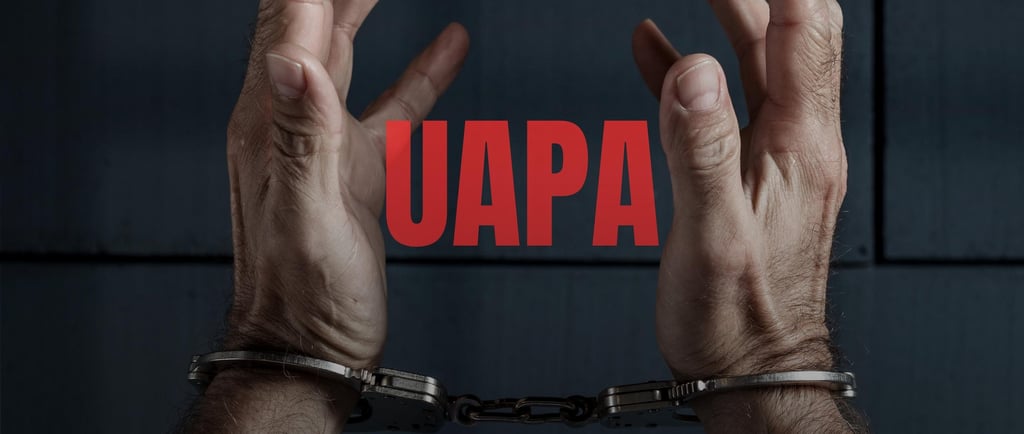Supreme Court Permits High Courts to Proceed with Petitions Challenging UAPA Amendments.
The Supreme Court of India, on Tuesday, clarified that High Courts across the country are free to continue hearing petitions challenging the amendments made to the Unlawful Activities (Prevention) Act (UAPA). A Bench led by Chief Justice of India (CJI) Sanjiv Khanna, along with Justices PV Sanjay Kumar and KV Viswanathan, made this observation while hearing a batch of petitions that contest the constitutionality of certain provisions of the UAPA, particularly those introduced through the 2019 Amendment Act.
2/5/20253 min read


During the proceedings, CJI Khanna emphasized that the Supreme Court should not act as the court of first instance in such matters, except under rare and exceptional circumstances. He noted that when complex legal issues are brought directly before the apex court without first being adjudicated by High Courts, it often leads to complications. “A lot of problems arise. Sometimes issues are left unresolved by one side and sometimes by the other; then we have to refer the matter to a larger bench, and it becomes an issue. We will have it before the High Court,” observed CJI Khanna. This statement underlines the Court’s stance that High Courts, with their constitutional authority, are well-equipped to handle such cases initially, allowing the Supreme Court to step in only when necessary for appellate review or constitutional interpretation.
Following these observations, the Bench issued an order clarifying that all petitions pending before various High Courts concerning the UAPA amendments can proceed without any hindrance. This directive is significant as it ensures that challenges to the controversial provisions of the UAPA will not be delayed due to jurisdictional confusion or procedural roadblocks at the Supreme Court level.
The case in question involves multiple petitions, some of which have been pending before the Supreme Court since 2019. Among the petitioners are individuals like Sajal Awasthi and organizations such as the Association for Protection of Civil Rights (APCR), an NGO committed to defending civil liberties in India. The core of their argument revolves around the validity of Sections 35 and 36 of the UAPA, as amended by the 2019 legislation.
The UAPA Amendment Act, 2019, introduced a controversial provision that grants the central government the authority to designate individuals—not just organizations—as terrorists. Under the amended Sections 35 and 36, the government can unilaterally notify any person as a terrorist without the need for a judicial trial or conviction. This represents a significant departure from the earlier legal framework, where only organizations could be labeled as terrorist entities.
The petitioners argue that these provisions are unconstitutional as they violate fundamental rights enshrined in the Indian Constitution, particularly Articles 14, 19, and 21. Article 14 guarantees the right to equality before the law, Article 19 protects freedom of speech and expression, and Article 21 ensures the right to life and personal liberty. The NGO APCR contends that labeling individuals as terrorists without due process can lead to lifelong stigma, social ostracization, and irreparable harm to personal dignity and reputation.
Moreover, the petitioners assert that the amended provisions lack adequate safeguards against misuse. They argue that the power to designate individuals as terrorists without the requirement of a prior conviction or a fair trial opens the door to potential abuse by authorities. This could result in individuals being targeted for political reasons, dissenting opinions, or other non-criminal activities under the guise of national security.
Another key concern raised in the petitions is the absence of a robust judicial review mechanism. Although the UAPA provides for a review committee to examine the government’s decision to designate someone as a terrorist, the committee’s composition and procedural framework are criticized for lacking independence and impartiality. The petitioners argue that this falls short of the constitutional requirement for effective judicial oversight, thereby undermining the principles of natural justice.
The Supreme Court’s decision to allow High Courts to continue hearing these petitions is likely to expedite the legal process. High Courts, with their vast experience in dealing with constitutional matters, can thoroughly examine the facts, legal provisions, and arguments presented by both sides. Their judgments will not only provide immediate relief to the affected individuals but also create a body of case law that can guide future legal interpretations.
This development also highlights the critical role of High Courts in safeguarding constitutional rights and maintaining the balance of power in a federal system. By empowering High Courts to address these challenges, the Supreme Court reinforces the principle of judicial federalism, where both the apex court and the High Courts share the responsibility of upholding the rule of law.
The outcome of these cases will have far-reaching implications for civil liberties, national security laws, and the broader legal framework governing counter-terrorism in India. If the High Courts find the provisions unconstitutional, it could lead to significant amendments to the UAPA, ensuring stronger safeguards for individual rights. Conversely, if the provisions are upheld, it may set a precedent that expands the government’s powers in the name of national security, potentially at the cost of personal freedoms.
In conclusion, the Supreme Court’s clarification that High Courts can proceed with hearing petitions challenging the UAPA amendments marks an important step in the ongoing legal battle over civil liberties in India. It ensures that the voices of affected individuals and civil society organizations will be heard in courts across the country, fostering a robust dialogue on the delicate balance between national security and constitutional rights.
